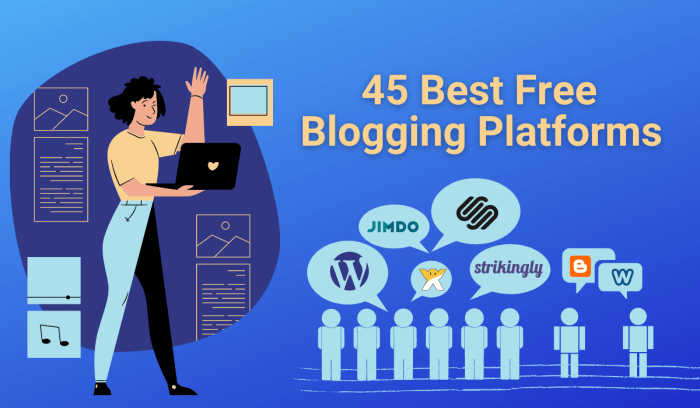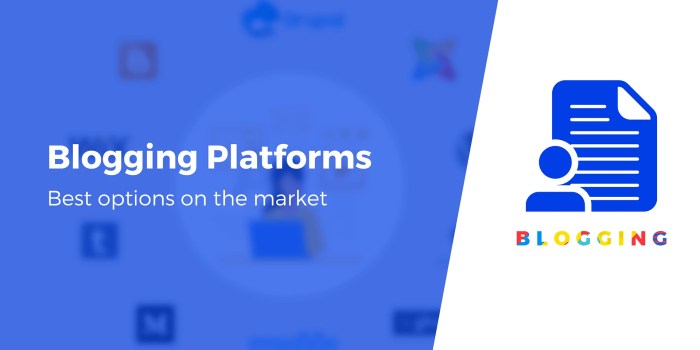Best Blogging Platforms: Ready to dive into the world of blogging with the top platforms that offer endless possibilities and creativity? Get ready to explore the ultimate tools for your blogging journey!
Blogging platforms play a crucial role in creating and managing blogs, providing essential features and customization options for users. Let’s uncover the best platforms available in 2021 and how they can elevate your blogging experience.
Introduction to Blogging Platforms: Best Blogging Platforms

Blogging platforms are online software services that allow individuals or businesses to create and manage their own blogs. These platforms provide the tools and resources needed to publish content, customize the design of the blog, and interact with readers. In the digital world, blogging platforms play a crucial role in making it easy for anyone to start a blog without the need for technical expertise.
Popular Blogging Platforms
- WordPress: One of the most popular and versatile blogging platforms, offering a range of themes, plugins, and customization options.
- Blogger: A user-friendly platform owned by Google, known for its simplicity and integration with other Google services.
- Medium: A platform focused on writing and reading long-form content, with a built-in audience of readers.
- Squarespace: Known for its beautiful templates and drag-and-drop editor, making it easy to create visually appealing blogs.
Key Features of the Best Blogging Platforms

When choosing a blogging platform, it’s essential to consider the key features that each platform offers. These features can make a significant difference in the success and functionality of your blog. Let’s take a look at some of the essential features of the best blogging platforms.
Customization Options
One of the crucial aspects of a good blogging platform is the level of customization it provides. Top platforms offer a wide range of themes, templates, and plugins that allow bloggers to personalize their sites according to their preferences. The ability to customize the design and layout of your blog is essential for creating a unique and engaging user experience.
- Themes: Choose from a variety of pre-designed themes or create your own custom theme.
- Templates: Easily customize the layout and structure of your blog with customizable templates.
- Plugins: Add functionality to your blog with a wide range of plugins for social media integration, optimization, and more.
User-Friendly Interface
A user-friendly interface is another critical feature of the best blogging platforms. A clean and intuitive interface makes it easy for bloggers to create and publish content without any technical expertise. A user-friendly platform can help streamline the blogging process and improve overall productivity.
- Easy Content Creation: Simplified tools for creating and formatting blog posts, including text editors, media upload options, and scheduling tools.
- Intuitive Dashboard: Manage your blog efficiently with a user-friendly dashboard that provides easy access to essential features and settings.
- Mobile Optimization: Ensure your blog is mobile-responsive for on-the-go publishing and editing.
Popular Blogging Platforms in 2021
In 2021, there are several popular blogging platforms that cater to different needs and preferences of bloggers. Each platform has its own strengths and weaknesses, along with a specific target audience in mind.
WordPress
WordPress is one of the most widely used blogging platforms in 2021, known for its flexibility and customization options. It offers a wide range of themes and plugins to enhance the functionality of a blog. However, the learning curve can be steep for beginners who are not familiar with the platform. WordPress is suitable for bloggers looking for a highly customizable platform with a large community base.
Blogger
Blogger, owned by Google, is a user-friendly platform that is easy to set up and use. It offers integration with other Google services and provides a simple interface for writing and publishing blog posts. However, the design options are limited compared to other platforms, and there are fewer customization features available. Blogger is ideal for casual bloggers looking for a straightforward platform to share their content.
Medium
Medium is a blogging platform that focuses on high-quality content and community engagement. It allows users to write in-depth articles and connect with other writers and readers through comments and recommendations. However, Medium has limited customization options and does not allow users to monetize their content directly. Medium is best suited for writers and bloggers looking to reach a wider audience and engage in meaningful discussions.
Squarespace
Squarespace is a platform that offers both blogging and website building capabilities. It provides elegant templates and a drag-and-drop interface for easy customization. However, Squarespace can be expensive compared to other platforms, and the blogging features may not be as advanced as dedicated blogging platforms. Squarespace is ideal for bloggers looking to create a visually appealing website with integrated blogging functionality.
Customization and Design Options
When it comes to creating a unique and visually appealing blog, customization and design options play a crucial role. Let’s dive into the design flexibility offered by different blogging platforms and how it can impact the overall look of your blog.
Design Flexibility Across Platforms
Different blogging platforms offer varying degrees of design flexibility. Some platforms provide extensive customization options, allowing users to personalize every aspect of their blog, from colors and fonts to layout and widgets. On the other hand, some platforms have more limited design capabilities, restricting users to pre-designed templates with minimal customization.
- WordPress: Known for its versatility, WordPress offers a wide range of themes and plugins that allow users to customize their blogs extensively. Users can modify the CSS code, add custom widgets, and create unique layouts to reflect their brand or style.
- Blogger: While Blogger provides a simpler interface compared to WordPress, it still offers basic customization options such as choosing from various templates, adjusting colors and fonts, and adding gadgets to the blog sidebar.
- Squarespace: Squarespace is popular for its sleek and modern design templates that are highly customizable. Users can easily change fonts, colors, spacing, and layout options to create a professional-looking blog.
Tip: When selecting a platform based on design preferences, consider your level of expertise in web design and the degree of customization you require. Choose a platform that aligns with your design vision and offers the tools you need to bring it to life.
Monetization Opportunities
When it comes to making money through blogging platforms, there are several monetization options available to bloggers. From ad revenue to affiliate marketing, bloggers have a variety of ways to generate income through their content. In this section, we will explore the different monetization opportunities across various platforms and discuss strategies for maximizing earnings.
Ad Revenue
- Many popular blogging platforms, such as WordPress and Blogger, offer ad revenue options for bloggers.
- Platforms like Google AdSense allow bloggers to display ads on their sites and earn money based on clicks or impressions.
- Bloggers can also work directly with brands to display sponsored content and earn a fee for promoting products or services.
Affiliate Marketing, Best Blogging Platforms
- Another popular monetization option is affiliate marketing, where bloggers earn a commission for promoting products or services and driving sales through unique affiliate links.
- Platforms like Amazon Associates and ShareASale provide bloggers with access to a wide range of affiliate programs to choose from.
- By strategically integrating affiliate links into their content, bloggers can earn passive income from their blog posts.
Product Sales
- Some platforms, like Shopify and WooCommerce, allow bloggers to set up online stores and sell products directly to their audience.
- By creating and selling digital products, such as e-books or online courses, bloggers can generate additional income streams.
- Platforms with built-in e-commerce functionality provide bloggers with the tools they need to manage inventory, process payments, and fulfill orders seamlessly.